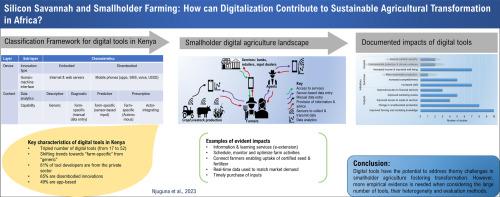Silicon Savannah and smallholder farming: How can digitalization contribute to sustainable agricultural transformation in Africa?
IF 6.1
1区 农林科学
Q1 AGRICULTURE, MULTIDISCIPLINARY
引用次数: 0
Abstract
CONTEXT
The development of smallholder agriculture in Africa faces numerous challenges. While digitalization is seen as a transformative opportunity for the continent's agricultural sector, there is limited empirical evidence on the effectiveness and impact of digital tools for smallholder farmers. This study examines the landscape of digital agriculture in Kenya, often called Africa's “Silicon Savannah,” to assess the current state and potential of these tools.
OBJECTIVE
The study seeks to answer two key questions:
1. To what extent can digital solutions for agriculture in Africa leverage the latest technological developments?
2. To what extent can these digital solutions effectively address the challenges faced by smallholder farmers?
METHODS
We developed a novel classification framework to categorize digital agricultural tools based on their physical attributes and analytical capabilities. A comprehensive stocktaking approach mapped digital tools across Kenya's agricultural value chains. Additionally, a literature review explored potential impact pathways through which digital tools can transform African agriculture, drawing on existing studies related to Kenya.
RESULTS AND CONCLUSIONS
The findings reveal that the number of digital tools available to smallholder farmers has tripled over the past decade, with a peak in new digital start-ups in 2016, followed by a slowdown. There is a shift from “generic” tools—focused on low-cost information exchange—toward “farm-specific” tools, offering tailored advisory services based on manual data input or sensor-generated data. Generic tools remain limited to information sharing, while farm-specific tools are increasingly using diagnostic, predictive, and prescriptive capabilities, supported by satellite imagery and sensors.
The analysis indicates digital tools can enhance farmers' knowledge and access to inputs, services, and markets, boosting productivity and income. However, there is limited evidence on their effects on food security, environmental sustainability, and climate resilience. Due to the heterogeneity of tools and evaluation methods, there is a lack of quantifiable, attributable evidence on their full impact.
SIGNIFICANCE
This review highlights the crucial role of digital tools in overcoming agricultural challenges in Africa. By assessing these tools' capabilities, the study identifies significant advancements in sensor technologies and data analytics for smallholder farming. The findings underscore areas of high impact and untapped potential, calling for further research on their long-term effects on agricultural outcomes.

硅谷大草原与小农耕作:数字化如何促进非洲的可持续农业转型?
内容提要非洲小农农业的发展面临诸多挑战。虽然数字化被视为非洲大陆农业部门的转型机遇,但有关数字工具对小农的有效性和影响的经验证据却很有限。本研究考察了肯尼亚(常被称为非洲的 "硅谷大草原")的数字农业状况,以评估这些工具的现状和潜力。 本研究旨在回答两个关键问题:1.非洲农业数字解决方案在多大程度上能够利用最新的技术发展? 2.这些数字解决方案在多大程度上能够有效解决小农面临的挑战? 方法我们开发了一个新颖的分类框架,根据数字农业工具的物理属性和分析能力对其进行分类。我们采用全面盘点的方法,绘制了肯尼亚农业价值链中的数字工具图。此外,文献综述借鉴了与肯尼亚有关的现有研究,探索了数字工具改变非洲农业的潜在影响途径。结果与结论研究结果表明,过去十年中,小农可用的数字工具数量增加了两倍,2016 年新启动的数字工具数量达到高峰,随后出现放缓。目前正在从以低成本信息交换为重点的 "通用 "工具向 "特定农场 "工具转变,后者根据手工输入的数据或传感器生成的数据提供量身定制的咨询服务。通用工具仍局限于信息共享,而针对特定农场的工具则在卫星图像和传感器的支持下,越来越多地使用诊断、预测和规范功能。分析表明,数字工具可以增强农民的知识,增加他们获得投入、服务和市场的机会,从而提高生产率和收入。然而,关于数字工具对粮食安全、环境可持续性和气候适应性的影响,目前证据还很有限。由于工具和评估方法各不相同,因此缺乏可量化、可归因的证据来证明它们的全面影响。通过评估这些工具的能力,研究确定了传感器技术和数据分析在小农耕作方面的重大进展。研究结果强调了具有重大影响和尚未开发潜力的领域,呼吁进一步研究这些工具对农业成果的长期影响。
本文章由计算机程序翻译,如有差异,请以英文原文为准。
求助全文
约1分钟内获得全文
求助全文
来源期刊

Agricultural Systems
农林科学-农业综合
CiteScore
13.30
自引率
7.60%
发文量
174
审稿时长
30 days
期刊介绍:
Agricultural Systems is an international journal that deals with interactions - among the components of agricultural systems, among hierarchical levels of agricultural systems, between agricultural and other land use systems, and between agricultural systems and their natural, social and economic environments.
The scope includes the development and application of systems analysis methodologies in the following areas:
Systems approaches in the sustainable intensification of agriculture; pathways for sustainable intensification; crop-livestock integration; farm-level resource allocation; quantification of benefits and trade-offs at farm to landscape levels; integrative, participatory and dynamic modelling approaches for qualitative and quantitative assessments of agricultural systems and decision making;
The interactions between agricultural and non-agricultural landscapes; the multiple services of agricultural systems; food security and the environment;
Global change and adaptation science; transformational adaptations as driven by changes in climate, policy, values and attitudes influencing the design of farming systems;
Development and application of farming systems design tools and methods for impact, scenario and case study analysis; managing the complexities of dynamic agricultural systems; innovation systems and multi stakeholder arrangements that support or promote change and (or) inform policy decisions.
 求助内容:
求助内容: 应助结果提醒方式:
应助结果提醒方式:


